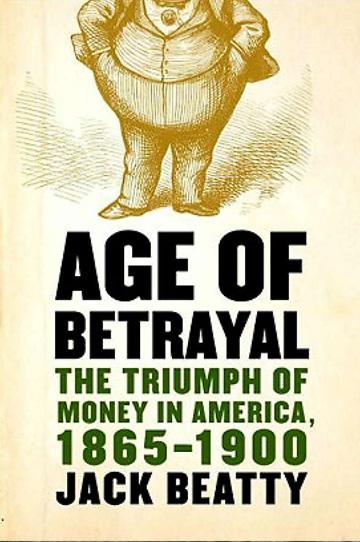The decades between Reconstruction in the 1860s and 1870s and the Progressive era at the beginning of the 20th century are commonly known as the Gilded Age — all robber barons and cigar chomping and Pinkertons and trusts. Jack Beatty suggests a new name: the Age of Betrayal. Beatty, an editor of the Atlantic Monthly and a cheerful left-wing presence on the excellent NPR program “On Point,” writes with palpable anger at the many failures of American government in this unregulated era, when strikers dodged howitzer buckshot and captains of industry filled senators’ pockets in return for subsidies and land grants. “This book tells the saddest story,” he writes. “How, having redeemed democracy in the Civil War, America betrayed it in the Gilded Age.”
As students of legal history know, what might seem the least dangerous branch actually did the most damage. In a series of decisions, the Supreme Court gutted the postwar constitutional amendments, those “sleeping giants,” in the words of historian Eric Foner, and artfully read the Constitution to provide broad protections to corporations and property owners. The 14th and 15th Amendments provided limited protection against actions taken by states and private individuals, and separate was equal: With these simple holdings Jim Crow was legitimized. Meanwhile, the justices somehow located in the 14th Amendment’s protection against taking property without due process a constitutional “liberty of contract,” and used it to strike down states’ minimum wage and workplace safety laws. Outrageous statutory interpretations paralleled this constitutional chicanery; for instance, the Sherman Antitrust Act was held to apply to labor unions but not to manufacturing corporations.
The absence of regulation, however, does not a laissez faire economy make. With huge sops to companies and railroads that resemble todays’ pork-stuffed tax and energy legislation, government looked after the ones who counted. The bribes and conflicts of interest that secured this largesse are breathtaking. Beatty focuses on Tom Scott, an overlooked railroad executive who during the Civil War served as assistant secretary of war while still vice president of the Pennsylvania Railroad. From his government desk he set the rates his company could charge to transport federal troops and materials; needless to say, Uncle Sam didn’t get a bargain.
Beatty is tremendously well read, and in these pages he effectively synthesizes generations of historical scholarship. His influences are clear and well chosen: Foner, C. Vann Woodward, Kevin Phillips, to name a few. But his hostility to the monied classes, relentless as wave after crashing wave, will be too much for some readers. In a representative caricature, an executive “nip[s] into his mahogany study to fetch talismans of his authority,” while outside, strikers “defied authority; not just a company, but a company-state with a grip on their minds.” Beatty lampoons the anti-slavery preacher Henry Ward Beecher, who flirted with social Darwinism, for having a very public extramarital affair; one wonders if Bill Clinton would come in for the same treatment. The railroad corporations, which unquestionably were ruthless, are faulted even for indisputably positive innovations like standardizing time zones: Beatty fears any industry so powerful that it can “annihilate time.”
To his great credit, Beatty confronts several difficult issues of the era (many of which spill over into today’s politics), such as the tendency of the Populists, whom he otherwise admires, to anti-Semitism and race-baiting. But not all: He never quite takes sides on the tariff, one of the only fully aired issues of a time when there wasn’t always much substantive difference between the parties. Moreover, today no serious legal thinker disputes that the Supreme Court stumbled badly when it invented a constitutional right to freedom of contract. The harder (and unanswered) question is whether it is also illegitimate for today’s court to use the same methodology to create a constitutional right to privacy that protects gay people, women seeking abortion and anyone buying contraceptives.
Anyone is bound to react hotly to at least some portion of this book, and it is a credit to the author that he can evoke strong responses to, let’s face it, a pretty boring era. There should be more serious works of history this passionate.
